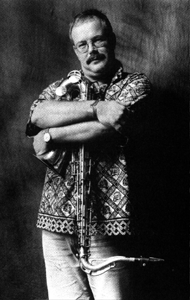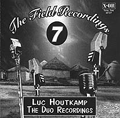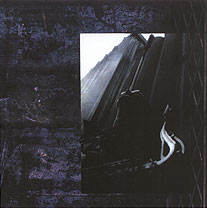

Courtesy of Luc Houtkamp

X-OR

Entropy Stereo
A FIRESIDE
CHAT WITH LUC HOUTKAMP
Just
back from tour, Luc Houtkamp sat down with the Roadshow. Houtkamp is yet
another of the endless stream of creative improviser to come out of Europe.
These musicians are taking music based in traditional jazz and giving
it the face lift it has been desperately looking for. Houtkamp doesn't
even classify under what is conventionally thought of as jazz these days.
Playing the saxophone and utilizing electronics, Houtkamp is a new breed.
Thank god. I present Houtkamp unedited and in his own words.
FRED JUNG: Let's start from the beginning.
LUC HOUTKAMP: Although I didn't come from a musical family, I always had
an interest in music. As a child, I discovered a collection of classical
records from my half-brother. He got married to a woman who hated music,
so he gave his record collection to my parents. They were mostly the popular
classics: Beethoven piano sonatas 8 and 14, Wagner (The Flying Dutchman),
Mozart, Mendelssohn (Italian Symphony), etc. I loved it all and pretended
I was a conductor and conducted for whole afternoons standing on a chair
in front of the record player. When I was about thirteen, I got already
bored with rock. I was looking for better stuff. So I started listening
to blues and from blues to jazz and I always had an interest in contemporary
composed music. I heard a lot of new music on the radio, taped it, and
wrote the details about the music in a booklet.
FJ: Was the saxophone your first instrument?
LUC HOUTKAMP: I started playing the saxophone when I was fourteen. I had
only a brief formal training with a private teacher. Those were the wild
Sixties. I was listening to all those Impulse! records of Ayler, Shepp,
and Coltrane. I tried to imitate those players and played along with their
records. My parents were not musical, but they had an artistic background.
I went to an art college instead of the conservatory to learn painting.
I was a very bad painter, but I met some musicians there too and got involved
and played my first gigs. When I got my saxophone (my father gave an old
alto for my birthday), things went fast. The first ICP records came out
and I ordered them. I went to concerts, saw Willem Breuker and Brotzmann.
I saw Clifford Jordan and Dexter Gordon playing with Han Bennink and met
friends to play music with. At the art college, there was a small electronic
studio. Michel Waisvisz organized that studio. As he was playing with
ICP, he got all kinds of guest teachers in like Han Bennink and Gilius
van Bergeijk. That was how I met Sven-Ake Johansson, who decided to stay
in Den Haag for a year. With him, I started playing my first concerts.
One of the first concerts was in London at the ICES Festival in 1972.
That festival was the end of an era and the beginning of a new. Everybody
played there. The old fluxus people: Nam June Paik, Carlotte Moorman,
the improvisers: AMM, Lol Coxhill, the composers: Cage, Gavin Bryars,
the youngsters: Steve Beresford (that was my first meeting with him).
So that whole festival was a big learning school for me. I knew that things
would be different from now on. I started a duo with Sven and I got some
work too: a festival in Gent, Belgium, concerts in Holland, a week in
a nightclub in St. Pauli in Hamburg for an audience of dining people.
When I stopped playing with Sven (he moved back to Germany, so it was
hard to play much together), I played mostly with Dutch musicians in ad
hoc groups and usually went over to London twice a year to play all those
door money gigs with people like Steve Beresford, John Russell and Peter
Cusack. An important development was starting a trio named Klimaat in
the early Eighties with violin player Maartje ten Hoorn and bass player
Jan den Boer. In that group, I developed the basic elements of my personal
style. We played a lot as a trio, but also worked with our English friends,
especially John Russell.
FJ: Influences?
LUC HOUTKAMP: Mengelberg, Raaymakers, Shepp, Monk, Rollins, Stockhausen,
Messiaen, Elmore James, John Lee Hooker. I liked all kinds of music and
listened to it and it is still the same. I like to go to the essence in
music and then it doesn't matter much which style it is or if it is serious
or popular music. But at the same time, I am a jazz lover by nature. I
went backwards in history with my interests very soon. I started with
those Impulse! records, but then listened to Charlie Parker, to Ellington
and later discovered Louis Armstrong, Johnny Dodds, Fats Waller, etc.
I used to go to Amsterdam to play with a piano player named Kees Hazevoet,
together with Han Bennink. He was always the big expert on jazz. He knew
all the obscure players: Herbie Nichols, Elmo Hope, Pete Brown, and Walter
"Foots" Thomas. First, we played a bit, smoked a lot of dope
and then we went to his house and listened to records.
FJ: As a largely self-taught musician, are you of the opinion that it
is necessary for a musician to study his instrument formally in order
to be respected amongst their peers?
LUC HOUTKAMP: Although I am not unhappy with the way I became a musician,
I would advice nobody to the same way. I think it is just the only way
I can do things myself. There is something inside of me that I can only
do things when I find them out myself. At school, I was not too good at
music and math, and yet I became a musician and a composer of computer
music. I think it is very important to learn your skills. My
friends mostly went to the conservatory and later became professors there.
I followed a totally other road, but they are still my friends. I think
it just depends on your character.
FJ: Any advice for the Gen X improvisers?
LUC HOUTKAMP: What should younger players do? That's really up to the
younger players, I would say. But if I'm allowed to say a little bit more,
I would say, find something personal and maybe opposed to ideas of the
older generation of improvisers. I see a lot of clichés in improvised
music now. There is the danger that it develops in the same way as jazz.
I hear lots of young Derek Baileys and Evan Parkers all the time. I don't
see why people are criticizing Wynton Marsalis, when the same thing seems
to happen in improvised music too. There are also other people now, like
younger musicians who are coming from the dance scene and who are doing
interesting things with electronics. But at the same time, they are also
using the old forms and structures, so it's merely a difference in sound.
I think it is much more interesting when there are other ideas about forms,
rather than other sounds. To me, it is important how music works and only
in the second place, how it sounds.
FJ: Do you have a particular approach to your instrument?
LUC HOUTKAMP: Here is a bit on my approach: I like it when it is very
hard to tell how much of my music is improvised and how much is composed.
I develop things at home and during concerts. I try to play the things
that I like again and I try to practice those things at home and work
them out more properly. So I don't have the feeling I am a pure improviser.
I am not a pure composer as well. I perform my own music, so I don't need
to write my music down. I can always decide to play my pieces different.
I always compare it to the way people in the Ellington band worked. Hodges
played the same solos every night, but he never composed them. He also
didn't improvise them. They were frozen improvisations. That is how I
look at it too. I am not against completely improvised music, but I don't
really know what that is. One can't just improvise completely blank. There
are always the things a player has developed over the years. So there
is always some compositional elements in the music. I only know of one
exception: Misha Mengelberg. He is the only one who can really sit behind
the piano and invent, or at least re-invent music on the spot. I have
a lot of admiration for that, but it's not my personal way of working.
I like to work in certain directions and see every concert as a phase
in working on one piece, a piece that never will be finished, but still
a piece.
FJ: For those in the know, Mengelberg's foundation is rooted in the traditions
of jazz, but he has managed to develop those conceptions and battered
them unrecognizable.
LUC HOUTKAMP: The two most influential people on my music were Misha Mengelberg
and Dick Raaymakers. Misha is perhaps much better known than Raaymakers,
who is an electronic composer, and is, like Misha, an excellent music
philosopher. They know each other very well and their ideas are almost
complementary to one other. From both, I learned to be radical and to
present my music in a barren form, without any adornment, that could lead
away from the subject.
FJ: You were one of the first improvisers I heard utilize electronic music,
what intrigued you about electronic music?
LUC
HOUTKAMP: The reason why I want to use electronics, especially computers:
one of the ideals in my music is to combine composition with improvisation
is such a way that you can't say what is improvised and what is composed.
Computer can help you with that. I write interactive programs that can
respond to improvisers. In those programs, I write the rules for a composition,
the possible combinations, etc., but not the composition. The computer
starts composing on stage as a response to what happens there. To me,
that gives a very interesting integration of compositional and improvisational
elements. With electronic music, but also with music in general, I am
more interested in processes than in the sound itself or in the medium
or the technology. I will never use electronics just for the fun of it.
But I am very interested in the possibilities that using electronics give.
I am recently writing software musical instruments, moving more into the
sound world of electronic music again (for the interactive pieces I always
used a Disklavier for the sounds). This year, my first CD will come out
that only has electronics on it. At first sight, I am moving more into
the direction of pure electronic music, but at the same time the music
was never more influenced by jazz as on this one. There is a modal free
jazz piece with an early Sixties Coltrane drive. There is a Monkish thirty-two
bar piece and there is even a version of Cole Porter's "Every Time
We Say Goodbye."
FJ:
Let's touch on your integral collaborations with John Russell.
LUC
HOUTKAMP: John is really an old friend, both personal and musical. Since
we started playing in the mid-Seventies, it has been like that and a few
years ago, I realized that we actually never recorded together. So I took
a flight to London in 1998 and recorded a track that I released on my
duo album: The duo recordings (X-OR FR 7). I would love to record a whole
album with him at some point, if I would only find a record label that
is interested in such a thing.
FJ:
And your work with the King Ubu Orchestra?
LUC
HOUTKAMP: I think I played in King Ubu for about five years. It was interesting
since I played solo or with duos or trios for most of my life. But after
a while, I started to get difficulties with the idea of just being part
of one collective sound. In group playing and even in solo playing, I
am very interested in clearness in sound and in orchestrations, more interested
in the relations between the different voices than in building one sound
with players. The most essential criticism I received from Fuchs at some
point was that he could hear me! From that moment on, I felt that I was
not really the right player for that group.
FJ:
What is the current scene in the Netherlands?
LUC
HOUTKAMP: I'm not only from the Netherlands, but from the city of Den
Haag and taking the risk to be seen as a provincial artist, I like to
say that this is something special. An interesting thing of the improvised
music scene in Den Haag is that it's so different from the Amsterdam scene.
Here in Den Haag, there is a much stronger connection to the electronic
and composed music scene. There is another excellent saxophone player
in Den Haag, Peter van Bergen and his group LOOS is very interesting.
He tries to combine composed and improvised music in a very personal way.
It's very different from my way of working, but the basic ideas are very
familiar. We are both interested in how to combine composed and improvised
music in a different way than simply having a score with blank places
where one is free to do whatever.
FJ:
You have primarily promoted your own music without the aid of a major
label or without exposure in magazines in the US. How difficult has it
been to balance artistry with business?
LUC
HOUTKAMP: It's not easy and it does take away some time that could be
better
used for other things. But on the other hand, it's to do it all yourself.
You yourself are the responsible person and you learn a lot too. I think
anybody who has a business has to handle his own company. Artist are not
at all an exception, although some see it as something which they are
too good for. I always feel that is an arrogance. An artist is not more
important than the owner of a grocery store, so besides that he needs
to sell good and fresh vegetables, he should make sure that others can
see how good they are! The reason for starting X-OR records is the usual
reason. I was promised a CD on an existing label, I recorded it, but then
the deal was cancelled. So I had to release it myself. That was my solo
CD, The Songlines. It sold quite well, so I looked for a partner in business
and found Gert-Jan Prins, who is an excellent percussionist and electronic
composer. We started to release different CDs of our own music and we
are now slowly start releasing work of other people too. We are basically
interested in music within the triangle: improvised music, electronic
music, and rock. So we have released material of composers like Gilius
van Bergeijk, Huib Emmer and Paul Termos, but also from Gert-Jan's rock
trio, Analecta. We have twenty CDs out now and this year we will release
another three.
Fred
Jung is Jazz Weekly's Editor-In-Chief and working to end shitty improvisation.
Email Him.